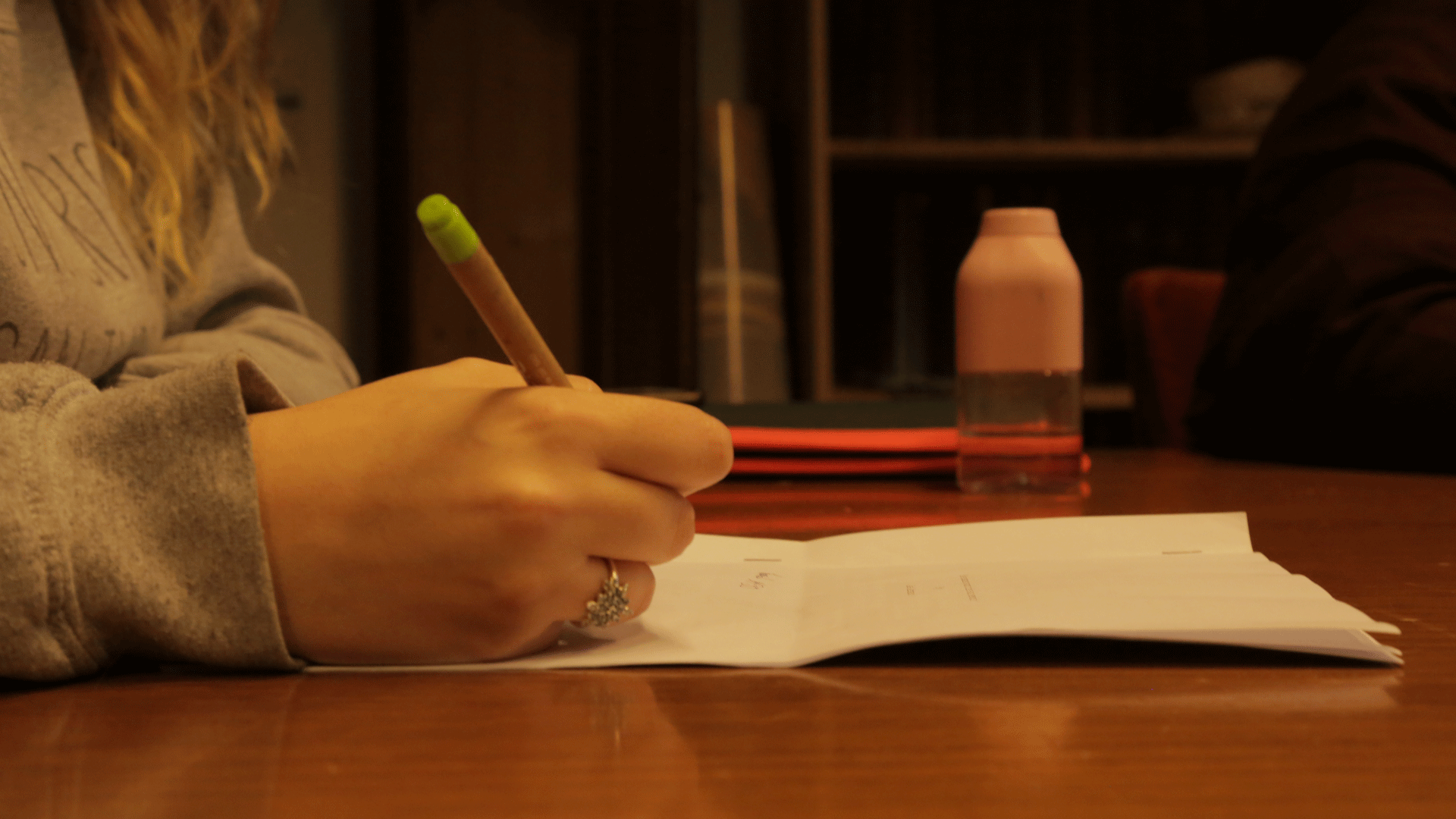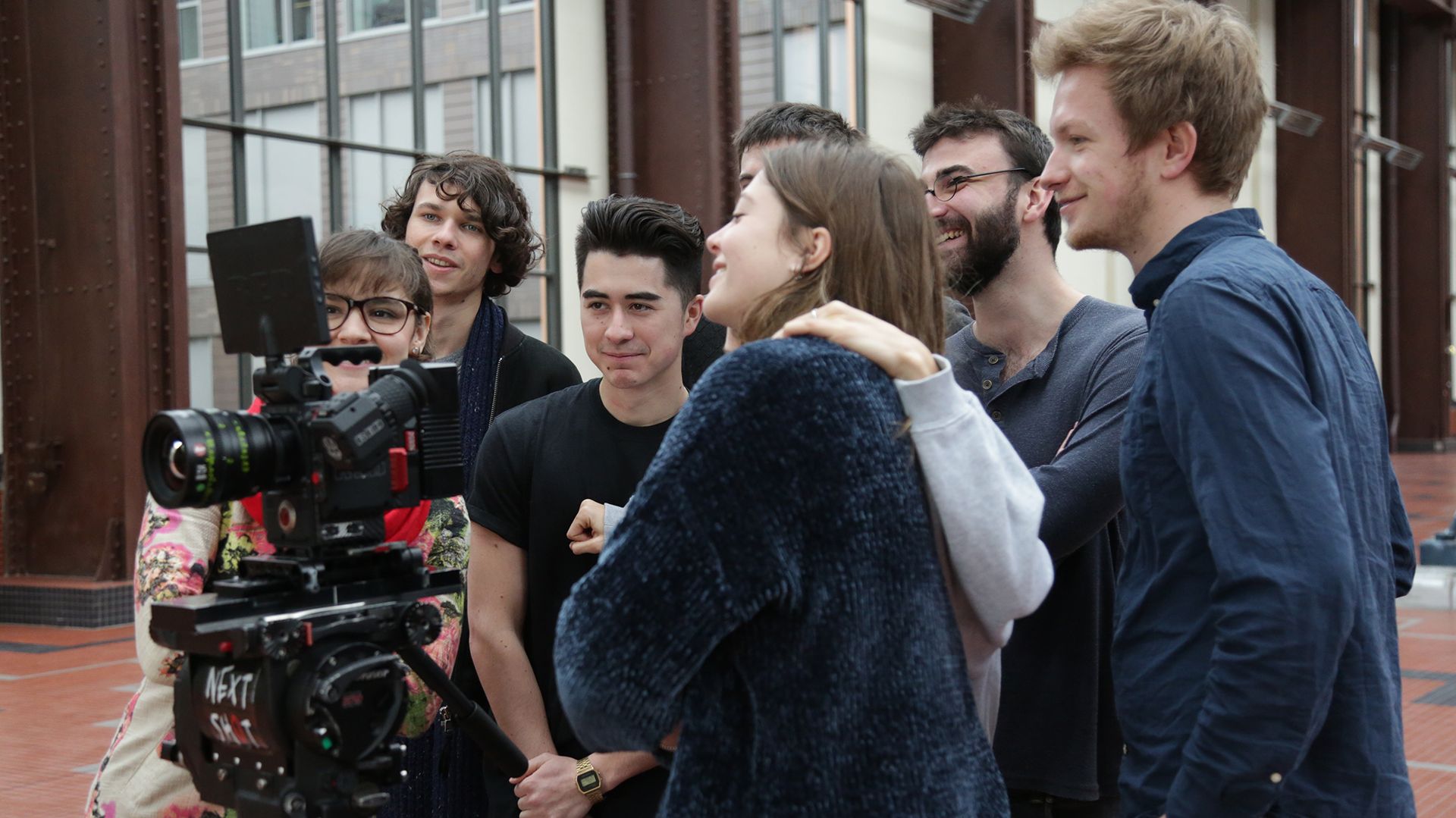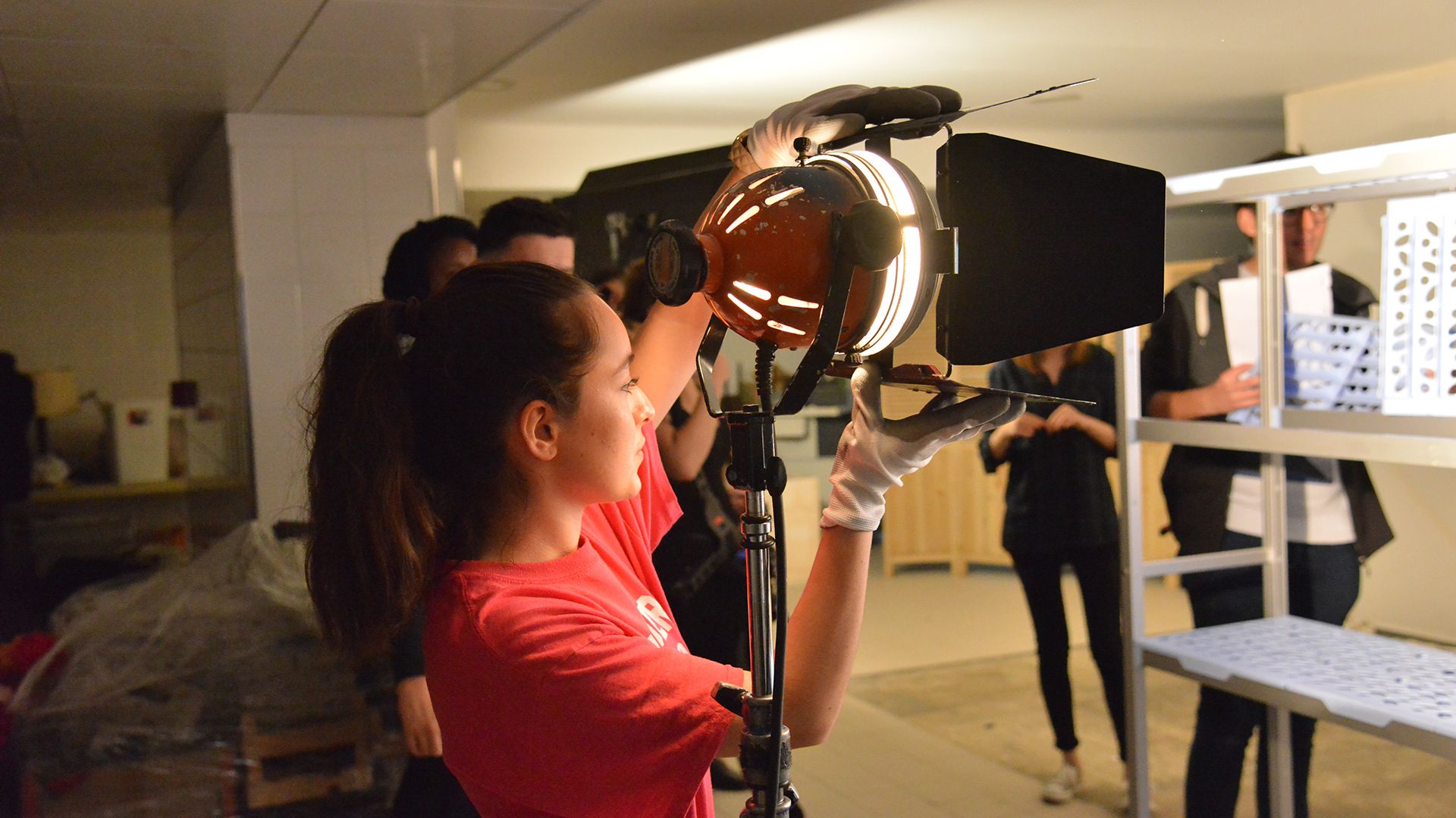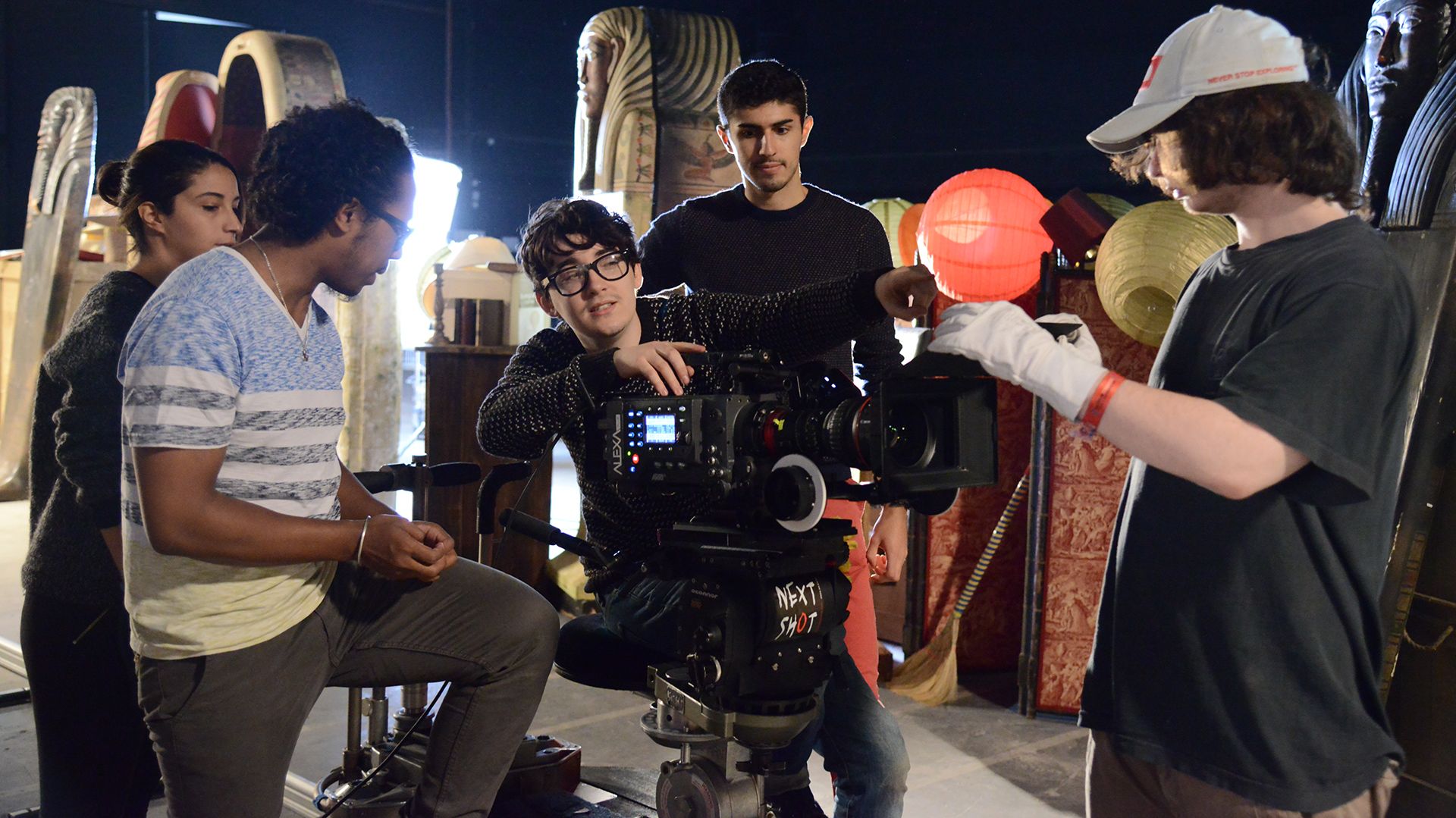The program

At the heart of the Cité du Cinéma and in a professional setting, the young authors and directors of tomorrow are learning their craft over a two year period. The process is focused on practical training, allowing students to experience, through internships and tutorials, the realities of their respective trades. This pedagogy compliments their above studies with real contribution on real works in progress, led by professionals already recognized in the field.
Our pedagogy
The pedagogy of l’École de la Cité combines an ambitious, innovative and even audacious playing field for learning a craft, directly correlating to the specific needs and requirements demanded in todays audiovisual sector. To do this, the teachers and mentors are for the most part, all professionals in the sector. The two-year program alternates between lectures, practical exercises, workshops and internships.
Classes
Throughout their training, students must carry out various projects in teams regrouping the two sectors: script writing and directing. Each student is obliged to work intimately with each others projects thus experiencing all of the positions in a film crew, either as the talent, DPs, sound technicians, grips and/or electricians, etc. covering all aspects of production.
There are also classes on theory, which are essential to the understanding of the cinematographic art, the economic realities peculiar to the film industry, all of which are aimed at helping to smooth the process/transition into professional sectors. Great importance is also given to communicating and being capable to work in English, as more than ever, the proficiency and capacity of this, is a decisive criterion of employability. At the end of each year, students must make a final project, thus validating their admission to the next year: a script for the writers and a short film from one of these scripts for the directors.
Internships
The students' schedule is continually adapted to the activity of the Cité du Cinéma and to the eventual presence of talent. On-site films, programs and series regularly offer internship opportunities to students either directly on set, in the production office or in post.
Master classes
The School regularly invites renowned professionals to host master classes allowing for the transmission of direct experience to students, in addition to theoretical knowledge.
Challenges
The school experience is enriched throughout the year thanks to our regular ‘challenges’ coming from outside professionals with audiovisual needs.
A diploma recognized by professionals and Ministry of Labour
Beyond technical and artistic competence, the school attaches great importance to the transmission of a savoir faire based on listening, respect, commitment and exemplarity. Thanks to this teaching model based on technical practice and knowledge of the field, students will leave with a diploma that is recognized in the audiovisual profession. They will be able to find jobs corresponding to the needs of contemporary Cinema, Television or the Internet, as well as be set to embark upon the creation of their own short or feature films, be it in fiction, TV, documentary, music video clips or commercials. The school issues titles registred with the RNCP under the number 321v level I for scriptwriting title and the number 323v level I for directing title.
Validation of acquired experience
If you are a professional in the audiovisual sector, l’École de la Cité diplomas in directing and scriptwriting are accessible by way of the VAE (Validation of Acquired Experience). You can complete "the VAE booklet" using the "notice" and send us your request via "contact us" or by post.
The profession of Script-writing
Often after the initiative of an original idea, the script-writer draws the architecture of the film, develops themes, colors, moods, determines the crux and soul of each character and then with the precision of a goldsmith, must balance this with the whole. The Author is the keystone element, essential for the foundation of a film. There is no story without a teller.
Potentially working on projects of various nature and form (e.g. feature films, made for TV movies/series, documentaries, animated films…), the scriptwriter always pursues the same objective: to conceive of a story that materializes in the form of a standardized document, i.e. the script, which is then used by the various members of the team involved in the making of the film (e.g. the director, talent, technicians...). If they’re expected to be both inventive and original, they are none-the-less also expected to know how to adapt to the specific constraints of each project through the application of appropriate techniques. Their proven skills in dramaturgy translate into what can be seen as a true
demonstration of mechanics in precision.
L’École de la Cité aims to be an environment that nurtures imagination and prioritizes personal expression, all the while refining technical capacity and the ability to work collectively. French and English are the two languages used in study.
The author-writer training highlights three specific skill blocks: The first emphasizes that screenwriting students be observant to what’s being done in the world
around them and what’s been done already, as well as to how elements from real life can add depth to their own projects.
The second part emphasizes the development of stories, including: the study of dramaturgy, different methods of writing, theory, screen dialogue, and attention to cultural differences existing in major movie producing countries.
The last block focuses on script development through analysis, taking into account both feedback and theory, with the focus being on what is in the end, best for the story at hand.
« The scriptwriter conceives of a story and materializes it in the form of a scenario, which is then the blueprint for the entire team involved in the making of a film (director, talent, technicians...) »

The profession of Directing
Whether for cinema, television, institutional or advertising, whether at the origin of a project or in assignment, the director has full artistic and technical responsibility of the audiovisual project at hand to be produced. He/she assures the direction; choosing the creative concept, overseeing preparation including the engagement of all other professionals, all the way to supervising the final production of the film. The director ensures responsibility for each stage of creation for the audiovisual work, from pre-production to production, from editing to the final mix, even to potentially participating in the promotion of the film.
Director Training is divided into three skill blocks. First and foremost, students learn how to prepare a shoot. It’s in pre-production that the project is negotiated; the choice of an artistic bias, the building of a crew and the recruitment of talent...
The second part is production. It consists of directing the film crew and talent; ensuring the technical direction in collaboration with the heads of each dept. and the proper direction of actors, according to the needs of the script.
The last block is devoted to the post-production of the film. The Director oversees the editing, mixing and color correction of their film. From there, their dedication turns to the promotion of their film.
L’École de la Cité transmits theoretical knowledge that can be applied transversally and strives to develop the young directors ability to adapt and anticipate and sharpen their sense of organization, in terms of both time and fiscal management.
« The director ensures responsibility for each stage of creation for the audiovisual work, from pre-production to production, from editing to the final mix, even to potentially participating in the promotion of the film. »




